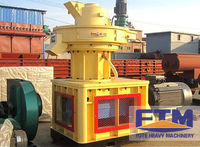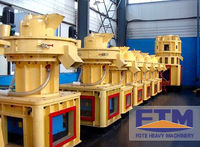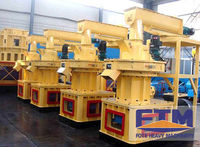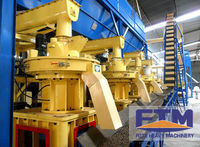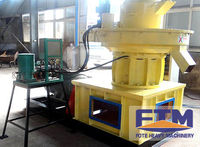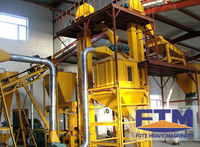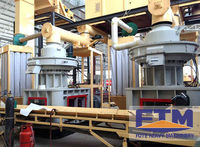Certificated Biomass Pellet Production Line for Sale
Product Quick Detail
- Packaging
- N/A
- Delivery
- 25 Days
Specifications
Biomass briquetting is a process to make the loose biomass with irregular shape into regular shape solid briquette fuel through crushing, drying, and pressing under certain temperature and pressure. The produced briquettes are usually stick, block or pellet shape with high density. The process of certificated biomass pellet production line for sale can improve the transportation and storage ability of biomass, also improve its combustion performance, utilization efficiency and expand its applied range.

Now there are different types of certificated biomass pellet production line for sale in the market, but the briquetting process is generally the same:
1. Raw material collection
If you want to set up a complete biomass briquetting plant, the first you need to consider is the raw material collection. This includes the service radius of the plant, the raw material form and status.
2. Raw material crushing
The wood block, tree bark, stalk, straw or other biomasses with large size needs to be crushed by crusher or hammer mill. The sawdust or rice husk with small size does not have to be crushed.
But for making biomass pellets, usually the raw material must be pulverized in below 2mm. if necessary, twice or third time crushing is also adopted.
3. Biomass raw material drying
The suitable moisture content for briquetting is 10-15%. But most of the time, raw material does not have the right moisture.
If the raw material contains too much moisture, it will block the briquetting press mold. Sometimes the excessive moisture may cause sudden expansion of the raw material when temperature rise during briquetting, and ultimately cause explosion.
But if the biomass is too dry, briquettes are too hard to form.
The frequently used drying machine is rotary drum dryer or vertical air flow dryer.
4. Biomass briquettes pre-pressing
To increase briquette productivity, the loose raw material is pre-pressed first before pushed into the forming mold. The briquetting press usually adopts a screw propeller or hydraulic pusher.
5. Briquetting press heating
The heating temperature inside briquetting press is between 150-300℃. The high temperature can soften the lignin in biomass and make them adhesive, so that the particles can be pressed together under pressure. The heat is generated by the friction of raw material and the machine components.
6. Briquette forming
This is realized in the forming mold of the briquetting press. The great pressure can extrude the raw material into the forming mold and force it go out the mold gradually, and then solid briquettes are shaped.
7. Briquettes cooling and packing.
The manufacturers most of the time make biomass briquettes for sale. In this case, the briquettes need to be cooled and packed in bags or boxes. For some manufacturers who want to make charcoal briquettes, the charring process is indispensable.
Knowing the biomass briquetting process will help you better understand the briquetting plant and what equipments you need for the plant. But for the specific raw material and requirements, the configurations vary. So the best way is to contact the professional briquetting expert Fote Machinery for advice.
Contact Infomation
Email: info@sinoftm.com
Website: http://www.paradisedivingasia.com/equipment/biomass-pellet-plant.html
Address: High and New Industrial Zone, Kexue Revenue, High and New Technology Industrial Development Zone, Zhengzhou, China
- Country: China (Mainland)
- Business Type: Manufacturer
- Market:Europe
- Founded Year:1982
- Address:High and New Industrial Zone, Kexue Avenue, High and New Technology Industrial Development Zone, Zhengzhou, China
- Contact:account che
Other products from Henan Fote Heavy Machinery Co., Ltd.
Relate products of Certificated Biomass Pellet Production Line for Sale
Our biomass pellet production lineefficiently transforms organic waste into high-quality pellets for sustainable energy use. Featuring advanced machinery, it ensures precise grinding, drying, pelletizing, and cooling processes to optimize pellet density and durability. Designed ...
Popular biomass pellet production line for sale has been popular in many areas. It is mainly composed of crushing part, drying part, pelletizing part, cooling part, sieving part, etc. 1. Crushing and drying parts of biomass pellet production line: If your raw materials are ...
How to start a biomass pellet plant project/biomass pellet production line is usually raised by clients or potential clients who possess abundant and sufficient biomass material such as wood blocks, wood sawdust or saw shavings, bark, tree branches and twigs as well as rice ...


